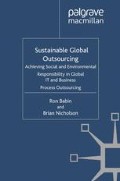Abstract
Outsourcing success is never guaranteed. The Outsourcing Center and the Farmer School of Business Administration at Miami University, Florida, USA,1 examined the causes of outsourcing failure and found that 11% of the 256 respondents identified poor communication as a frequent cause of outsourcing failure, whereas 40% of the respondents believed that better communication would add more value to the outsourcing relationship. According to the Outsourcing Unit at the London School of Economics, UK, “The outsourcing highway is littered with casualties.” It cites multiple examples of outsourcing failure since 2000,2 including the following:
-
UK retailer Sainsbury’s, which announced in 2004–2005 a write-off of $254 million of IT assets and a further $218 million write-off of automated depot and supply-chain IT, the aftermath of a failed seven-year deal to outsource its IT operations;
-
US financial services firm JPMorgan Chase & Co., which scrapped a $5 billion contract in 2004 with the intention of moving the IT work back in-house; and
-
the remarks made by the chairman of a powerful UK House of Commons committee, who described an American outsourcing company as “cowboys who should be run out of town” over their handling of the Lorenzo electronic patient record system for that country’s National Health Service.3
Sustainable outsourcing opens up life opportunities for people in India who would otherwise have much less. M. Ellison, Senior Manager, Co-operative Financial Services
Sustainability is embedded in the measurement of every individual, that’s what they, and our vendors, have to do to be successful in our world. Jim Slack, CIO, Co-operative Financial Services
Sustainability issues do not go away [with outsourcing]. They are complex and inter-related, across all business sectors. Sustainability Lead, IBM Canada
Access this chapter
Tax calculation will be finalised at checkout
Purchases are for personal use only
Preview
Unable to display preview. Download preview PDF.
Notes
Goolsby, K. and F. K. Whitlow (2004). Eight Buyer-Provider Disconnect Areas Likely to Cause Outsourcing Failures. Dallas, TX, The Outsourcing Center: 1–19.
Willcocks, L., S. Cullen, et al. (2011). The Outsourcing Enterprise. From Cost Management to Collaborative Innovation. Basingstoke, Hampshire, Palgrave Macmillan.
Hoek, R. V. and M. Johnson (2010). “Sustainability and Energy Efficiency: Research Implications from an Academic Roundtable and Two Case Examples.” International Journal ofPhysical Distribution amp;Logistics Management 40 (1/2): 148–158.
Friedman, M. (1970). “The Social Responsibility of Business is to Increase its Profits.” New York Times (September 13) New York.
Pinkston, T. S. and A. B. Carroll (1996). “A Retrospective Examination of CSR Orientations: Have They Changed?” Journal of Business Ethics 15 (2): 199.
Carroll, A. (1991). “The Pyramid of Corporate Social Responsibility: Toward the Moral Management of Organizational Stakeholders.” Business Horizons 34: 39–48.
Falck, O. and S. Heblich (2007). “Corporate Social Responsibility: Doing Well by Doing Good.” Business Horizons 50: 247–254.
See Emerson, J. (2003). “The Blended Value Proposition: Integrating Social and Financial Returns.” California Management Review 45(4): 35–51; and Elkington, J., J. Emerson, et al. (2006). “The Value Palette: A Tool for full Spectrum Strategy.” California Management Review 48 (2): 6–28.
Samasource CEO Leila Chirayath Janah, Janah, L. C. (2009). Socially Responsible Outsourcing: Promoting Equal Access to Opportunities in Low-Income Regions. The 2009 Asia-Pacific Outsourcing Summit, Kuala Lumpur.
Heeks, R. and S. Arun (2009). “Social Outsourcing as a Development Tool: The Impact of Outsourcing IT Services to Women’s Social Enterprises in Kerala.” Journal of International Development 22: 441–454.
Lacity, M., J. Rottman, et al. (2010). “Field of Dreams: Building IT Capabilities in Rural America.” Strategic Outsourcing International Journal 3 (3): 169–191.
Nyoro, J. (2011). Job Creation through Building the Field of Impact Sourcing. New York, Rockefeller Foundation: 1–40.
Nidumolu, R., C. K. Prahalad, et al. (2009). “Why Sustainability Is Now the Key Driver of Innovation.” Harvard Business Review 87 (9): 56–64.
Lewis, N. S. (2007). “Powering the Planet.” Material Research Society (MRS) Bulletin 32 (October): 808–820.
Koomey, J. G. (2008). “Worldwide Electricity Used in Data Centers.” Environmental Research Letters 3: 8.
Koomey, J. G. (2011). Growth in Data Center Electricity Use 2005 to 2010. Palo Alto, CA, Stanford University: 20.
Laitner, J. and K. Ehrhardt-Martinez (2008). Information and Communications Technologies: The Power of Productivity–How ICT Sectors Are Driving Gains in Energy Productivity. Washington, DC, American Council for an Energy Efficient Economy.
Mason, K. (2008). A Carbon Reduction Framework for Buyers of Business Travel. Cranfield, Business Travel Research Centre, Cranfield University: 1–54.
Jackson, R. B., S. R. Carpenter, et al. (2001). “Water in a Changing World.” Ecological Applications 11 (4): 1027–1045.
Crane, A., D. Matten, et al. (2008). Corporate Social Responsibility, Readings and Cases in Global Context, London, Routledge.
For example, Willis, A. (2003). “The Role of the Global Reporting Initiative’s Sustainability Reporting Guidelines in the Social Screening of Investments.” Journal of Business Ethics 43 (3): 233–237.
Bhattacharya, C. B., S. Sen, et al. (2008). “Using Corporate Social Responsibility to Win the War for Talent.” MIT Sloan Management Review 49 (2): 37–44
Author information
Authors and Affiliations
Copyright information
© 2012 Ron Babin and Brian Nicholson
About this chapter
Cite this chapter
Babin, R., Nicholson, B. (2012). Why Is Sustainable Outsourcing Important?. In: Sustainable Global Outsourcing. Technology, Work and Globalization. Palgrave Macmillan, London. https://doi.org/10.1057/9781137035318_2
Download citation
DOI: https://doi.org/10.1057/9781137035318_2
Publisher Name: Palgrave Macmillan, London
Print ISBN: 978-1-349-33013-3
Online ISBN: 978-1-137-03531-8
eBook Packages: Palgrave Business & Management CollectionBusiness and Management (R0)

